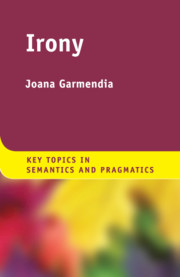Crossref Citations
This Book has been
cited by the following publications. This list is generated based on data provided by Crossref.
Pakharenko, Anastasiia
2019.
Features of the strategy of discrediting in the English authoritarian discourse of children.
Odessa Linguistic Journal,
Kreuz, Roger J.
and
Johnson, Alexander A.
2020.
Producing Figurative Expression.
Vol. 10,
Issue. ,
p.
263.
Baker, William
2020.
XVIII Bibliography, Textual Criticism and Reference Works.
The Year's Work in English Studies,
Vol. 99,
Issue. 1,
p.
1267.
Lehmann, Claudia
and
Bergs, Alexander
2021.
As if irony was in stock.
Constructions and Frames,
Vol. 13,
Issue. 2,
p.
309.
Harling-Lee, Katie
2021.
Caught in the Regime: Classical Music and the Individual in the Contemporary Novel.
Open Library of Humanities,
Vol. 1,
Issue. 1,
Darbyshire, Philip
2022.
How to appear fully committed to doing nothing at all about structural and systemic racism: A modest proposal for health and higher education services.
Nursing Inquiry,
Vol. 29,
Issue. 1,
2022.
Modeling Irony.
Vol. 12,
Issue. ,
Schilling, Natalie
2022.
“Backwards Talk” in Smith Island, Maryland.
American Speech,
Vol. 97,
Issue. 4,
p.
483.
2022.
Figuring out Figuration.
Vol. 14,
Issue. ,
Banasik-Jemielniak, Natalia
Kałowski, Piotr
Akkaya, Büşra
Siemieniuk, Aleksandra
Abayhan, Yasemin
Kandemirci-Bayız, Duygu
Dryll, Ewa
Branowska, Katarzyna
Olechowska, Anna
Glenwright, Melanie
Zajączkowska, Maria
Rowicka, Magdalena
Pexman, Penny M.
and
Jonason, Peter Karl
2022.
Sarcasm use in Turkish: The roles of personality, age, gender, and self-esteem.
PLOS ONE,
Vol. 17,
Issue. 11,
p.
e0276073.
Banasik-Jemielniak, Natalia
2022.
“Unicorn humour isn’t very subtle.” Graphic novels and comics as a potential didactic tool for teaching irony to children: the example of Dana Simpson’s Phoebe and her unicorn.
Journal of Graphic Novels and Comics,
Vol. 13,
Issue. 2,
p.
302.
Herman, Thierry
and
Oswald, Steve
2022.
Conspiracy theory discourses.
Vol. 98,
Issue. ,
p.
99.
Lehmann, Claudia
2023.
Multimodal Im/politeness.
Vol. 333,
Issue. ,
p.
251.
2023.
The Cambridge Handbook of Irony and Thought.
p.
15.
Charles, Florence
and
Godart-Wendling, Béatrice
2023.
La fiction animalière comme voix/voie pour appréhender l’ironie à l’école élémentaire ?.
Pratiques,
Vol. 199-200,
Issue. ,
Bye, Patrik
2023.
The Wiley Blackwell Companion to Morphology.
p.
1.
Mazzarella, Diana
and
Pouscoulous, Nausicaa
2023.
Ironic speakers, vigilant hearers.
Intercultural Pragmatics,
Vol. 20,
Issue. 2,
p.
111.
Kałowski, Piotr
Zajączkowska, Maria
Branowska, Katarzyna
Olechowska, Anna
Siemieniuk, Aleksandra
Dryll, Ewa
and
Banasik-Jemielniak, Natalia
2023.
Individual Differences in Verbal Irony Use: A Systematic Review of Quantitative Psycholinguistic Studies.
Metaphor and Symbol,
Vol. 38,
Issue. 1,
p.
81.
Mazzaggio, Greta
Zappoli, Alessandra
and
Mazzarella, Diana
2023.
Verbal irony and the implicitness of the echo.
Pragmatics & Cognition,
Vol. 30,
Issue. 2,
p.
412.
Veale, Tony
2023.
The Cambridge Handbook of Irony and Thought.
p.
216.



